Passages: Gennadi Touretski, Coach of Alexander Popov & Michael Klim, Dies at 71
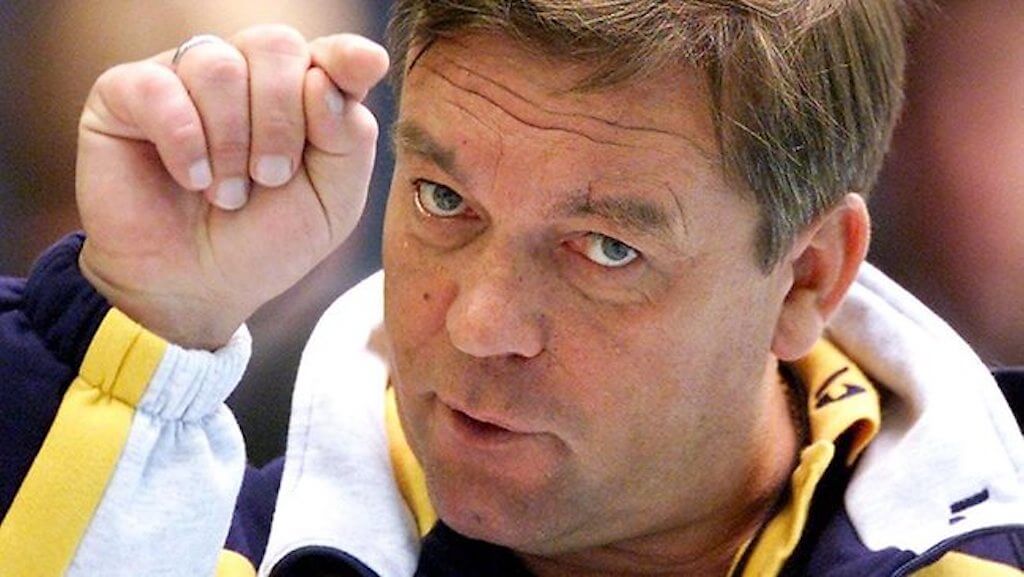
Legendary swim coach Gennadi Touretski passed away on Friday at his home in Switzerland, according to a report from the Russian Swimming Newsletter. Touretski was 71 and suffered a fatal stroke.
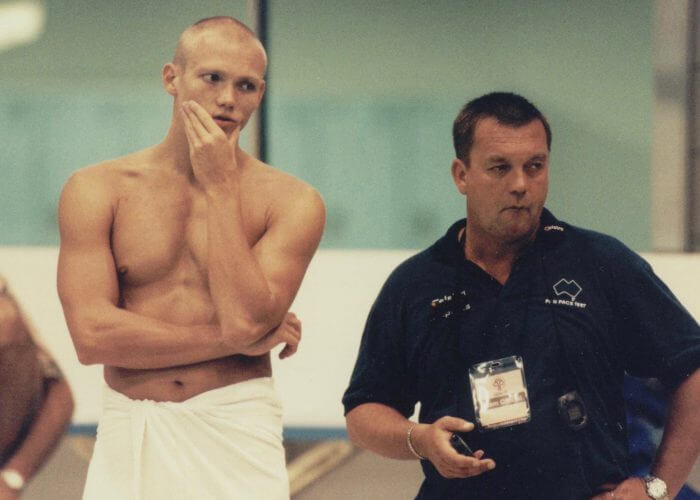
Photo Courtesy: Darrin Braybrook / Swimming World Archive
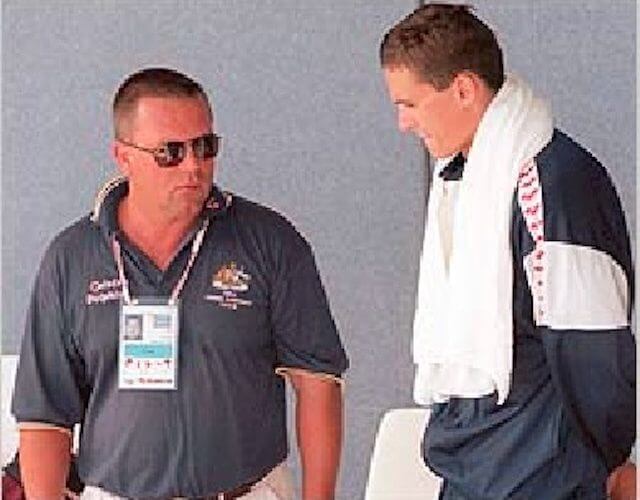
Gennadi Touretski and Alex Popov
He started coaching in 1973 and began work with the Soviet national team in 1979. From there, Touretski built a sterling career, as he coached legendary sprint star Alexander Popov to double Olympic gold in 1992 and 1996. Popov long revered Touretski and gave the coach his 1996 Olympic gold medal from the 100 freestyle. Touretski was also the mentor to sprint standouts Gennadi Prigoda, Vladimir Pyshnenko* and Andrey Grechin during his days in Russia.
After the fall of the Soviet Union, Touretski worked as a chief specialist at the Australian Institute of Sport in Canberra where he was based from 1992 until he was dismissed in 2002. While in Australia, Touretski coached Olympic medalist Michael Klim, who has been selected for induction into the International Swimming Hall of Fame. Popov followed Touretski to Australia, a nod to the tight relationship between the men.
Touretski’s dismissal from the Australian Institute of Sport was related to anabolic steroids being found by police during an investigation into a robbery at Touretski’s home in 2001. Touretski denied they were used to aid his athletes. He was forced to resign from his coach duties after stanozolol – the steroid made notorious by Ben Johnson – was discovered in a safe stolen from his home in Canberra.
Touretski’s training theories and practice were widely respected and followed, here one of many examples:
Mentor To Alexander Popov
Under Gennadi Touretski’s watch, Popov swept the 50 and 100 freestyles at the 1992 Olympics in Barcelona, and then replicated the feat at the 1996 Olympic Games. He fell short of an unprecedented threepeat when he won silver in the 100 freestyle in 2000, placing ahead of teammate Klim of Australia, who finished fourth in that race. Of the medal he gave Touretski from the 1996 Games in Atlanta, Popov said:
“I have a title and I’m on the result sheet, but Gennadi didn’t get anything from Atlanta, nor from Barcelona. I know how much this particular medal means for him, what it’s worth to him.”
A former National Team Member, Gennadi Touretski earned a degree in engineering, majoring in biomechanics, biochemistry, fluid mechanics, and sports physiology.
In 1982 he helped to establish the Olympic Training Centre of the Soviet Union and in 1988 and 1992 he served as Olympic team coach for the Soviet Union and then “Unified Team” as the Soviet Union was dismantled on the way to the Barcelona Games.
In a presentation for the American Swimming Coaches Association in 1996, Touretski outlined Alex Popov’s preparation:
It was twenty years ago when I started as a coach that a very famous physiologist told me about the “Magic Sevens” in the preparation and sporting careers of athletes, seven years initial preparation, seven years of development and then seven years for the athlete to perform at the highest level.
Now I’m looking back and see the way we approached the plan, I’m trying to realize that since 1990 I can hardly find three races that Alex lost in any level of competition. It’s amazing because he had more than one thousand starts in that period of time.
Many people ask me about the key to Alex’s success. The answer is simple: Natural Talent multiplied by the ability to work consistently, coming from an understanding that you cannot dive twice into the same water, and the only way to win is non-stop perfection.
Let’s compare his Atlanta profile with how he looked in Barcelona; in Atlanta he was the same height as Barcelona, 200cm (6 feet 6.75 inches), his skinfold was 38mm (l.5 inches), but his weight had increased by 3kg (6.6 lbs.), so his technique has changed.
The key to his Olympic success is in his personality — the ability to learn and keep a clear mind in any circumstances. As an athlete since Barcelona he has learned to read fear in the eyes of opponents, how to communicate with the media, and even how to manage life in Australia.
Having a good education in coaching science he understands how to train and to be fit for the race; but few people know that he was sick at the World Championships in Rome in ’94, and at the European Championships in Vienna in ’95. The reason was that he lost his adaptation reserve as a result of the high intensity three weeks before the start.
In our Atlanta plan we paid more attention to fitness work, so Alex did not look so sharp at the beginning of the week’s competition. You may be interested to know that his technique is based on the three R’s: Rhythm, Relaxation, and Range.
Beauty comes from rhythm (an old saying), and rhythm leads the movement. The timing of his stroke is based on the kayak principle.
In predicting the opposition Alex would have in Atlanta, he did not believe that someone would break 49.0 seconds. It took me quite some time to explain to him that they would swim around 48.6 sees. You will see in the lecture how we make a model and plan for Alex’s races, training paces and intervals at the aerobic, anaerobic and MVO2, levels.
Training for any swimming event is highly complex. However, until recently, the effectiveness of training depended heavily on the coach’s skill, his intuition, his ability to motivate his swimmers and his ability to measure the effect of the training load.
However, we increasingly encounter the expression “scientific methods of controlling training”, which implies that intuitive decision making is supplemented by scientifically founded actions that rely on measurements of the athlete’s condition.
For example, people used to think that the most reliable way of increasing results was to simply arithmetically increase the volume of training in all its parameters. This seemed the only true way because this was the way that most of the record holders and champions achieved their success.
Today, training load volumes have reached such significant heights that, not only is increasing the training volumes not the ONLY WAY of improving results of top class athletes but often, it is an absolutely ineffective way of developing training programs for success.
If we have a look at the top 10 results of the 50m freestyle in 1986 and 1994, you would not notice any significant improvement. Is the result we have achieved the limit or can’t we develop training methods and views? I think the latter.
Let us put together the best 15 meters of Dano Halsall; 15-35 meter distance of Matt Biondi and last 10 meter of Alex Popov. We would have 19.83 for 50m Freestyle. Therefore it is crucial that we understand the complex mechanism that underlies a training system in order to prepare our swimmers for today’s sprint competition.
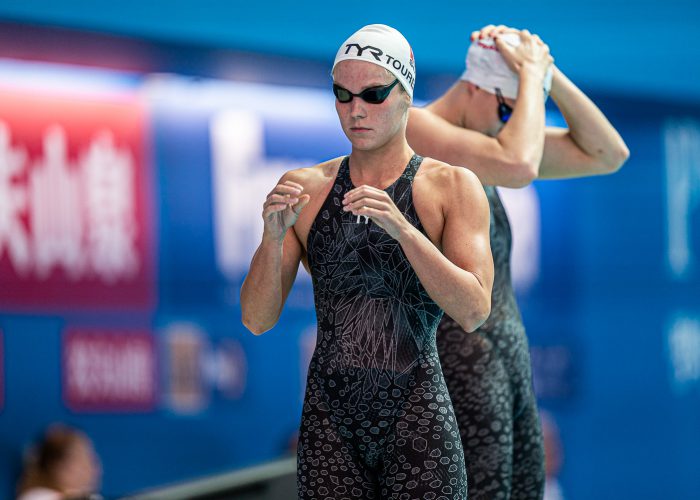
Sasha Touretski – Photo Courtesy: Becca Wyant
Touretski’s daughter Sasha is a former national team swimmer for Switzerland.
A former swimmer himself, Gennadi Touretski was a national champion in 1968 in the 400 and 1500 freestyle when he was coached by Alexei Krasikov.
In 1994, between Olympic doubles in Barcelona and Atlanta, Popov set a World short-course record of 46.74 over 100m freestyle at Gelsenkirchen in Germany. Our editor, Craig Lord, was on hand to witness it – but only just. He explains:
“After morning heats , I asked Touretski if I could interview Popov. ‘Sure,’ he replied, ‘meet us in the lobby at the hotel at 12, you get 10 minutes’. The 10 minutes up, Touretski told Popov to go and rest, turned to me and said ‘now we do the rest of the interview in my room’. Up we went and in his room were three other men, two coaches and the team doctor. Tourestski reached under the bed, pulled out a small suitcase and placed it on the bed, opened it to reveal a bottle and a row of small glasses and declared ‘one question, one vodka’. And so it went. The interview I got, along with the biggest headache in my life. I just made it in time for finals but it proved you can do the job under any circumstances if you put your mind to it, no matter how painful.”
“In that interview, Touretski took out some drawings, they including the work of Leonardo da Vinci and schematics of birds in flight. He wondered how a bird could fly thousands of miles and what role gliding and resting on the wing played – and how that might translate too understanding rest phases in swimming strokes and how better understanding on the theme might help improve swimming speed and endurance of that speed.”
Early tributes included these from French Sports Minister and 1998 200m backstroke champion for France, Roxanna Maracineanu, Swiss photographer Patrick Kramer, and Brazilian sprint coach Arilson Silva:
La natation est orpheline. Guennadi Touretski, partenaire indissociable d’Alexander Popov, est parti. Ensemble, ils ont révolutionné le sprint et marqué l’histoire de la natation. C’était un personnage truculent, il va nous manquer
— Roxana Maracineanu (@RoxaMaracineanu) August 8, 2020
The Fallout from the Stolen Safe Controversy and A drunken incident on a plane
In April 2001, Touretski broke his silence after he was charged with possession of steroids. He declared the accusations had “wounded my soul”, writes Craig Lord.
The coach said that he was coping with the pressure but was saddened that he could not defend his reputation until the lengthy court process was underway.
“Everything published, whether I like it (or not) – I am already damaged,” Mr Touretski said. “But, what should I do? Get up and stamp? I am in the court, the court will make the decision.”
He and his wife Inna were under strict instructions from their lawyer Jason Parkinson not to comment about the substance of the charges against him.
What Touretski could say was that he was glad that his swimmers had supported him.
“It would be better if my friends, my athletes, did not have to publicly defend me. I have no complaints but I gave my heart to this country, and now my soul is wounded.”
He as unsure how he might earn a living in future given the damage to his reputation from a find that uncovered medicine being taken by a family member.
Mr Touretski said he was not sure how he was going to find an income in future, given the international exposure of his case. While he was coping, his family, including his 6-year-old daughter Sasha, was scared. He said:
“We live in a robbed house, so every time we come in, the family is scared. If someone is knocking on the door, my daughter is scared and that’s
understandable.”
It saddened him all the more because he believed Australia to be the “best country” to raise children in an environment with “excellent opportunities for children to develop their skills” in sport.
His trial started in May that year. Touretski pleaded not guilty, and the charges were dropped in September when his wife refused to testify against him.
It took until November for the verdict to translate to a new start: Gennadi Touretski was cleared of wrongdoing and reinstated as a coach on the Australian national swim team after being cleared by an internal inquiry into charges of steroid possession.
Australian Swimming’s anti-doping policy obliged the body to undertake an internal investigation into the allegations, regardless of any court action.
In October the same year, Touretski underwent triple heart bypass surgery.
There was further controversy to come in another inquiry that led to Touretski being cleared. In 2002, when returning to Australia from coach duties on Mare Nostrum tour in Europe, there were reports of drunken behaviour and offensive remarks made to cabin crew on a Qantas flight.
Gennadi Touretski was suspended and subsequently dismissed from his coaching position at the Australian Institute of Sport (AIS), which he had held since late 1992.
In April 2003, after two days of court hearings in Sydney, a magistrate ruled that the three charges which relating to Touretski’s alleged harassment of one female passenger and assault on two male flight attendants be dismissed.
The female passenger called as a witness for the prosecution in relation to the first charge made it clear that she did not consider that Touretski’s behavior had in any way been offensive, a presumption of the cabin staff. It was also concluded that Touretski had not been drunk but his manner was rather of someone affected by medication in combination with the adverse impact of the long flight.
Touretski told Swimming World that he was determined to be present at the court hearing despite having to endure another extended plane journey from Switzerland where he was living by then, on top of the fears associated with the war in Iraq and the SARS virus.
The fact that Touretski did not deny “enjoying a drink” on the flight in question contributed to the events that led to the end of his time and tenure Down Under. He left Australia in January 2003 to take up a consultancy with the Swiss Olympic Committee. That allowed him to continue to coach Popov in readiness for what would be one of the most remarkable World-Championship campaigns in swimming history.
In his unique fashion, Touretski said he was “naturally very pleased” with the ruling and held no animosity towards those involved in the allegations. He described the experience, including two hours of cross-examination, as a somewhat surreal experience reminiscent of watching a courtroom movie drama unfold, except, in this case, it was real and he was the villain or star in the lights.
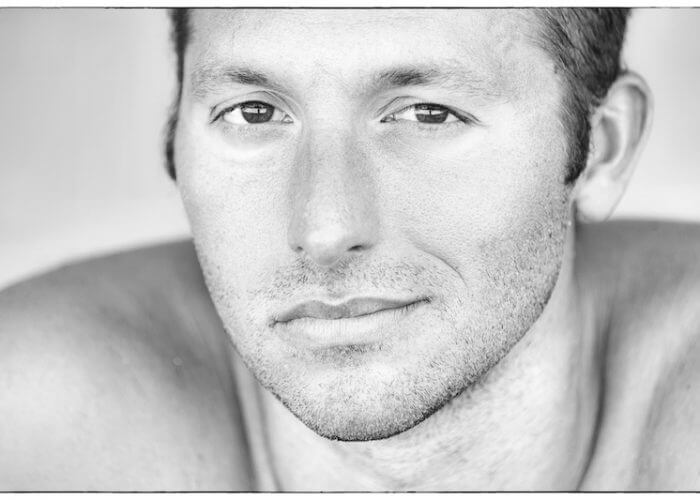
Ian Thorpe – Photo Courtesy: Patrick B. Kraemer © – taken in Switzerland when Thorpe was being guided for a short while by Gennadi Touretski
Touretski spent the rest of his working days coaching in Switzerland and briefly coached Ian Thorpe when the Australian mounted a comeback attempt in 2011. At the time Thorpe explained his choice when he looked back at a time that coincided with the heights of his own career with coach Doug Frost and said:
“I know when he worked with Alexander Popov and Michael Klim he worked closely with them to suit their individual needs and physiology, and he’s also a real student of the sport.”
Touretski, Thorpe added, was a coach who was “always thinking and is innovative with his training techniques looking for improvements”.
For his own part, Touretski noted:
“When I first heard about Ian returning to swimming I was pleased for him and I was also pleased for Australian swimming. We all know that he left the sport at a young age, and having seen him over the last couple of days I have no doubt that he still has plenty to offer the sport, and plenty to achieve from a personal perspective.”
Thorpe did not make the London 2012 team at Australian trials and his comeback ended there, the “personal perspective” holding the greater significance.
Tourestski on the need to see the swimmers as individuals; and on ‘feel for water’:
Gennadi Tourestski is survived by his wife Inna and their daughter Sasha.
* – Vladimir Pyshnenko, a member of the Russian 4x200m relay team that set a world record in the 1992 Olympics in Barcelona, was one of three Russian swimmers who tested positive for steroids at a training camp in Cyprus in October 1997. The other two swimmers were sprinter Natalya Mescheryakova, then European champion in the 50m free, and Olga Kochetkova, a backstroke specialist. They were all barred from the 1998 World Championships in Perth.




Sad news, what a great coach – RIP.
RIP legendary coach.
RIP Coach
Rip
Always a gentleman and that flight to Shanghai ! RIP G
Omg RIP he was a legend coach, I remember seeing him coach, he was the reason why I focused on butterfly he will be sadly missed
Vale.
Sara Stacy
“Small amount” ?
Thanks Roy… the quantitative words have been removed…
Glen Christiansen
Oh no!!! ???! We just met and talked swimming last year at Tenerife Top Training
RIP Gennadi.